
Putting home ownership within reach for a diverse workforce

Administrator accountability: 5 questions to evaluate outsourcing risks

Commercial real estate in 2020: Keeping up with the pace of change

Refinancing your practice loans: What to know

What type of loan is right for your business?

ABL mythbusters: The truth about asset-based lending

High-yield bond issuance: 5 traits lawyers should look for in a service provider

Easier onboarding: What to look for in an administrator

3 tips to maintain flexibility in supply chain management

Insource or outsource? 10 considerations

10 ways a global custodian can support your growth

Refining your search for an insurance custodian

4 questions you should ask about your custodian

Preparing for your custodian conversion

Service provider due diligence and selection best practices

Tactical Treasury: Fraud prevention is a never-ending task
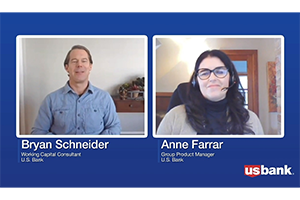
Webinar: Empower your AP automation with strategic intelligence

Evaluating interest rate risk creating risk management strategy
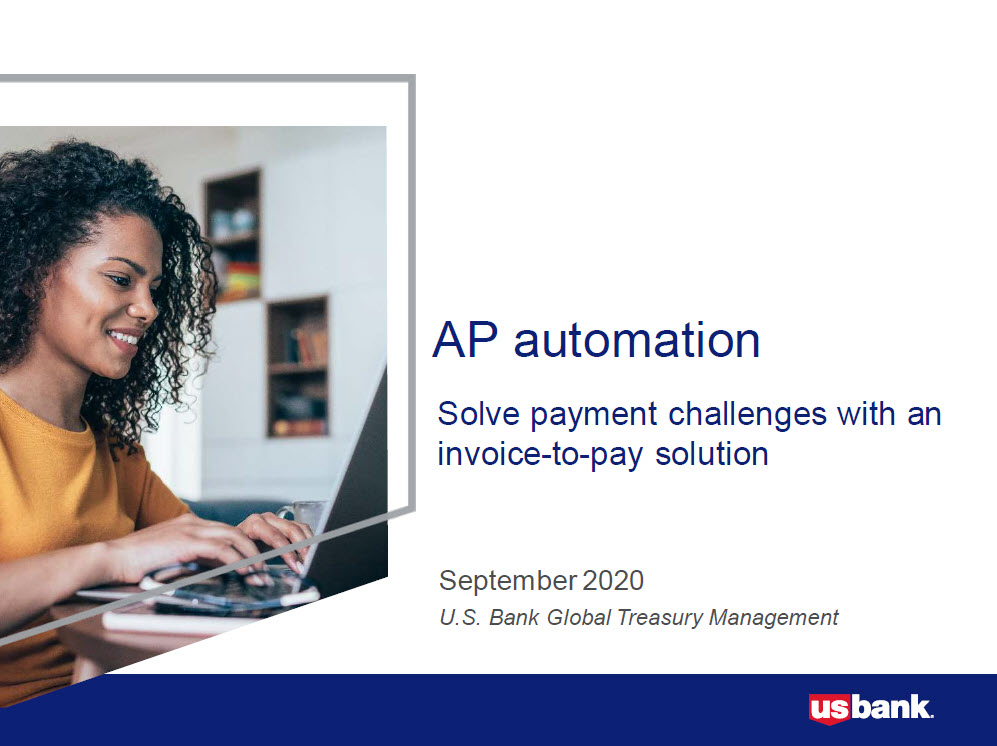
Webinar: AP automation—solve payment challenges with an invoice-to-pay solution
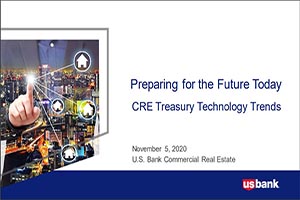
Webinar: CRE technology trends
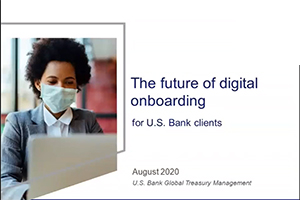
Webinar: The future of digital onboarding for U.S. Bank clients

Complying with changes in fund regulations

Business risk management for owners of small companies

Webinar: CSM corporation re-thinks AP

Adjust collections to limit impact of USPS delivery changes

ePOS cash register training tips and tricks

Cashless business pros and cons: Should you make the switch?

A simple guide to set up your online ordering restaurant

Addressing financial uncertainty in international business

Webinar: AP automation for commercial real estate

The benefits of payment digitization: Pushing for simplicity

5 winning strategies for managing liquidity in volatile times

Higher education and the cashless society: Latest trends

Ease your transition to remote banking

Buried treasure: Maximizing analytics for treasury management

Artificial intelligence in finance: Defining the terms

The future of financial leadership: More strategy, fewer spreadsheets

Choosing your M&A escrow partner

Employee benefit plan management: trustee vs. custodian

4 ways Request for Payments (RfP) changes consumer bill pay

Why retail merchandise returns will be a differentiator in 2022

High-cost housing and down payment options in relocation

The client-focused mindset: Adapting to differing personality types

The client-focused mindset: How to network effectively

The client-focused mindset: What do clients expect?

Automated escheatment – learn how to prevent and resolve unclaimed property

What corporate treasurers need to know about Virtual Account Management
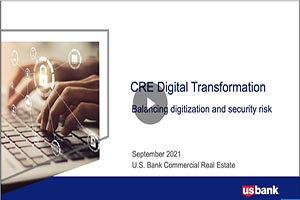
Webinar: CRE Digital Transformation – Balancing Digitization with cybersecurity risk

Webinar: Reviving mobility, what to expect

Webinar: DEI tips for transforming your mobility program

For today's relocating home buyers, time and money are everything

10 tips on how to run a successful family business

Crypto + Relo: Mobility industry impacts

Empowering team members

How entrepreneurs can plan for what matters most

Business tips and advice for Black entrepreneurs

Opening a business on a budget during COVID-19

How to fund your business without using 401(k) savings

The different types of startup financing

How to test new business ideas

How to get started creating your business plan

How to redefine challenges with business collaboration

8 ways to increase employee engagement

The role of ethics in the hiring process

How to hire employees: Employee referral vs. external hiring

Tips for building a successful customer loyalty program

Give a prepaid rewards card for employee recognition

Checklist: Increase lead generation with website optimization

How to reward employees and teams who perform well

5 steps for creating an employee recognition program

Gift cards can extend ROI into 2022

Omnichannel retail: 4 best practices for navigating the new normal

How business owners are managing during the supply chain crisis

Is your restaurant Google-friendly?

3 simple brand awareness tips for your business

How a small business owner is making the workplace work for women

What you should know about licensing agreements

6 common financial mistakes made by dentists (and how to avoid them)

The growing importance of a strong corporate culture

Unexpected expenses: 5 small business costs to know and how to finance them

Business credit card 101

How to apply for a business credit card

Technology strategies to complement your business plan

Meet your business credit card support team

How to choose the right business checking account

How Everyday Funding can improve cash flow

How a small business is moving forward during COVID-19

Prioritizing payroll during the COVID-19 pandemic

How jumbo loans can help home buyers and your builder business

8 Ways for small business owners to manage their cash flow

Break free from cash flow management constraints

How to make the most of your business loan

Leverage credit wisely to plug business cash flow gaps

5 tips for managing your business cash flow

Improve online presence your business

How Shampoo’ed is transforming hair and inspiring entrepreneurs

The San Francisco bridal shop that’s been making memories for 30 years

How Al’s Breakfast is bringing people together

Celebrity Cake Studio’s two decades of growth and success

In a digital world, Liberty Puzzles embraces true connection

How a bar trivia company went digital during COVID-19

How a travel clothing retailer is staying true to its brand values

How community gave life to lifestyle boutique Les Sol

How a group fitness studio made the most of online workouts

How to build a content team

How Wenonah Canoe is making a boom in business last

How (and why) to get your business supplier diversity certification

Use this one simple email marketing tip to increase your reach

Year-end financial checklist

6 questions students should ask about checking accounts

The A to Z’s of college loan terms

3 ways to keep costs down at the grocery store (and make meal planning fun)

Webinar: 5 myths about emergency funds

A who’s who at your local bank

How I did it: Learned to budget as a single mom

Webinar: Train your brain for smart financial habits

Webinar: Uncover the cost: International trip

Adulting 101: How to make a budget plan

How having savings gives you peace of mind

Allowance basics for parents and kids

Tips to overcome three common savings hurdles

Helpful tips for safe and smart charitable giving

How to manage money in the military: A veteran weighs in

U.S. Bank asks: Do you know what an overdraft is?

U.S. Bank asks: Transitioning out of college life? What’s next?

Here’s how to create a budget for yourself

Dear Money Mentor: How do I set and track financial goals?

How compound interest works

5 tips for parents opening a bank account for kids

5 tips to use your credit card wisely and steer clear of debt

30-day adulting challenge: Financial wellness tasks to complete in a month

First-timer’s guide to savings account alternatives

Essential financial resources and protections for military families

Travel for less: Smart (not cheap) ways to spend less on your next trip

Real world advice: How parents are teaching their kids about money

How to stop living paycheck to paycheck post-pay increase

Practical money tips we've learned from our dads

How to cut mindless spending: real tips from real people

6 ways to spring clean your finances and save money year-round

Dear Money Mentor: How do I pick a savings or checking account?

What financial advice would you give your younger self?

Bank from home with these digital features

How to increase your savings

Financial gifts can be a valuable – and fun – choice for the holidays

5 tips to use your credit card wisely and steer clear of debt

How to spot a credit repair scam


